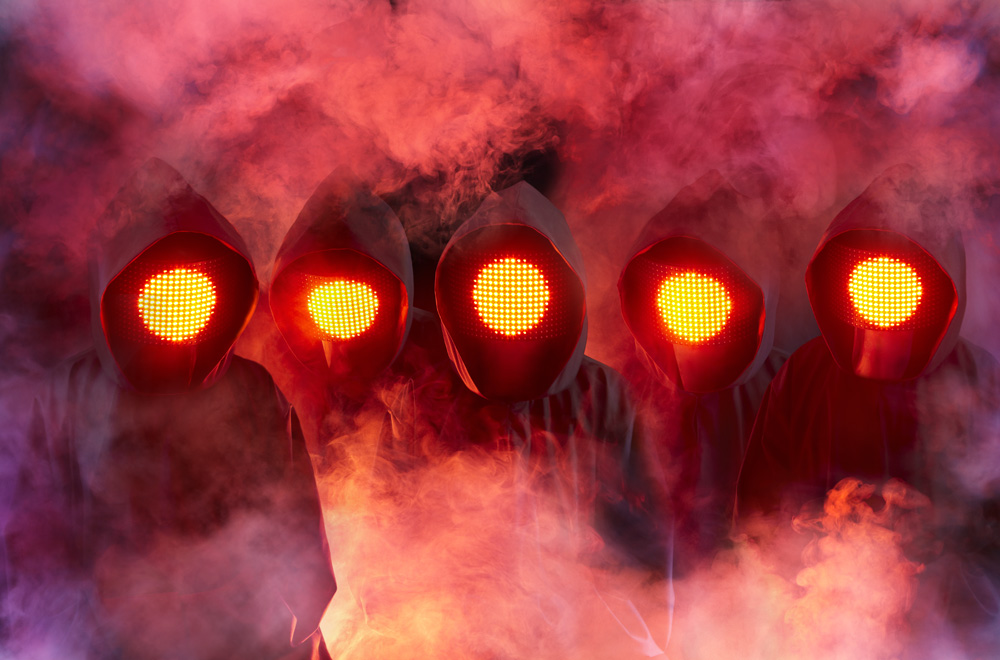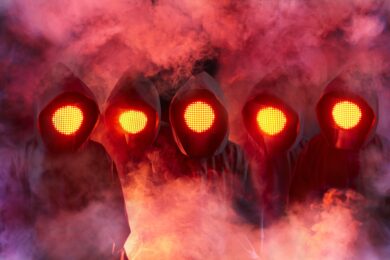I met Tom ‘Squarepusher’ Jenkinson after a show in Brighton in 2004. He’d just finished a ten minute set of extremely frenetic, spliced drum ‘n’ bass, complete with live bass sampling, projected artwork and yells to the crowd to "come the fuck on!" as part of a tour with the London Sinfonietta. He wasn’t in the most welcoming of moods, scramble-writing SIGNED’ on my ticket and speaking in monosyllables. Doing wonders for his image as Warp’s gifted but eternally reclusive savant, I did wonder what was so wrong.
Meeting him again at the Warp offices, a few of my thousand questions were finally answered. "I just get into a totally different head space during shows. I’m embarrassed to think of some of the things I’ve said and done, but a particular mindset is necessary for the kind of music I want to project."
Our second meeting is in lieu of a new, full band project that he is involved with called Shobaleader One, a name derived from a "misheard song lyric on the radio." He’s certainly an odd character, but it’s not the man I met in Brighton. Squarepusher’s music is an upliftingly intelligent tonic of fusion-influenced bass terrain and glitchy, caffeined-up laptop camaraderie. Shobaleader One, a five piece jazz/funk/RNB anonymous supergroup, is nothing like this. Its members, who have groundings in the metal scene, Jenkinson has had previous individual "associations with".
For one, he stands in as a vocalist. Forming a band was, for him, a logical step forward. "When I make music as Squarepusher, I have this idea of compartmentalising a group of imaginary musicians. In constructing certain ‘characters’ playing different musical roles, I find it easier to break the piece down and ensure that every aspect of it is contributing positively. It’s all me, of course, but it’s the process I’ve always adopted. With Squarepusher, my music’s a fantasy. With Shobaleader One, I actually have those compartments to hand."
Shobaleaders’s live set-up is as particular as it is grounded in Jenkinson’s principals and musical lineage. He mentions Lightning Bolt’s commitments to balancing instrumentation, and upon listening again to Delta V from 2009’s Just A Souvenir, you can hear the deliberate push for a more organic, collaborative sound – the album was, after all, a result of a dream Jenkinson had about a futuristic rock band. "In the past I’ve tried to make those distinctions hard to see, and then went full out on trying to do the opposite of that. My idea of operating a band is in line with the free jazz model of their being no one leader – each member contributing ideas where they see fit, taking responsibility for their area as well as they can – a group of band leaders, if you like."
It may also explain why donning monk robes and masks is consistent with the collective’s general outlook. "The mask lights correspond in real time to the music. We’re going to be dipping in and out of our material and my older, more complex stuff. So it should look fairly impressive. Nothing’s booked yet, though. When the band does go on the road, I want it to be superlatively good. We haven’t even started rehearse, so it’s quite early days really. We only started talking around Autumn of last year."
In experimenting with the far-reaching possibilities of his craft, Jenkinson has developed a reputation for prolific re-invention. "One way of putting it would be to say that up until very recently I’d gotten into certain habits regarding my approach to composition. This meant avoiding use of explicitly conventional song structures; trying not to use vocals; veering away from anything I’d consider a coercive melody line – catchiness if you like – those that are designed to get rooted inside your brain. In itself, catchiness is not enough. I’ve always had a kind of knee-jerk aversion to these kinds of rules. But if you don’t keep an eye on them, they form a basis for prejudice and habit. I want to be a musician that’s always open to new ideas, and up for reassessing old ones. With all that in mind, it struck me that it was high time I turned them on their head. They’d done me pretty well so far, but I’d be going against my self-image as an experimental artist if I didn’t allow myself to use vocals. To me, every area of music has a certain value, however perilous or voodoo-unfashionable."
So what next, I hear you ponder out loud, for Squarepusher? "At this point, it would be difficult to specify. I see Shobaleader as continuous of my solo work, so it’s no big leap for me really. Without any disrespect to the players, it’s more of a technical innovation." I ask him something that has been on the tip of every Squarepusher fan’s tongue since he was featured on BBC 2’s The Culture Show in 2006: Will you really collaborate with Outkast’s Andre 3000? "Yeah. He’s pathologically busy, I’m shit at organising things and am never really out of the studio, but it really does need to happen. My publisher’s on the case now though and we email each other from time to time. He’s a really lovely bloke and it would be excellent fun working with him. I asked him what one specific record he liked most by me, whether we should focus on a certain era, and he seems to be a fan of all of it. I can’t imagine that there are that many people in the world that really do like the whole lot. Even I don’t, ha ha."
Say whatever you want about the polymorphic musician, he has kept fans on their toes. His career has leap-frogged its way around a buffet of genres, from out and out lounge jazz to acid, IDM, funk, garage, gabba, ambient and pop and, without the merest battering of an eyelid, his set-up has changed unrecognisably once again. As impossible to pigeonhole as he is unperturbed by the possibility of alienating his core following, his wholly untrustworthy approach grants him the freedom to explore ideas of any conceivable remit. Be sure to catch the robed quintet on tour in the new year before he changes his mind again.



